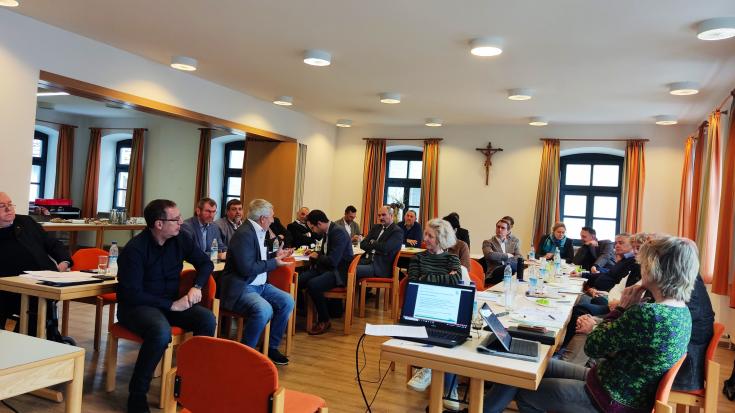Second Stakeholder Meeting in Germany of the EAGER project

An initial meeting with the "Integrated Rural Development ILE at Rott & Inn" cooperation, comprising eleven municipalities from the southern Passau district, marked a significant milestone for the Interreg Europe Project EAGER. The project is designed to engage local stakeholders in promoting agrivoltaics (Agri-PV) in the region, fostering a balance between agriculture and ground-mounted solar systems.
Setting the Stage
Agnes Frank, Project Manager at TZE, outlined the overarching goals of the EAGER initiative. Her presentation provided participants with a clear understanding of the interregional project’s objectives, emphasizing the value of international collaboration and the exchange of best practices to inform local policy improvements.
Methodical Support for Policy Development
Agnes Frank highlighted the methodical support offered by the project, as well as the multi-level co-coaching partnerships spanning local, provincial, regional, and national levels. During her presentation, she outlined a policy instrument for land-use planning that should be improved in the EAGER project and explained how it should be improved.
Inspiring Good Practices
The meeting encouraged out-of-the-box thinking to maximize land-use benefits while fostering acceptance of Agri-PV solutions. Agnes Frank showcased good practice examples from both Germany and other countries, generating keen interest among participants. She introduced several examples of innovative Agri-PV projects. A local example from Deutenkofen, Germany, showcases the integration of solar energy generation with fruit cultivation, demonstrating how renewable energy can coexist with agriculture. Similarly, the Fungisolar project in Spain combines photovoltaic systems with the cultivation of edible mushrooms, highlighting the versatility of Agri-PV applications across different agricultural practices. She also introduced a user-friendly online tool developed by KU Leuven for farmers, project developers, and policymakers to assess the suitability of Agri-PV projects, which has been instrumental in increasing acceptance and understanding of these systems. Additional examples discussed included Agrosolar and Greening of Greenhouses, offering diverse perspectives on how Agri-PV can drive sustainable development and energy transition.
Local Engagement
The meeting highlighted the critical role of community engagement in advancing Agri-PV solutions. Agnes Frank cited a successful example of Bavaria’s Energy Day in fostering innovation and collaboration in the energy transition.
Additionally, ILE introduced an excellent local engagement practice from the Öko-Modellregionen. A speed-dating format used by Öko-Modellregionen facilitates connections between regional producers, processors, marketers, and hosts (such as hoteliers, holiday apartment owners, and private landlords) within the districts. This innovative approach enables stakeholders to connect and collaborate more effectively. When applied to the EAGER project, such a platform could similarly build bridges between the energy production and agriculture sectors, enhancing cooperation and mutual understanding.
By bringing together local stakeholders and sharing actionable insights during this meeting, the EAGER project took an important step toward fostering collaboration and advancing practical solutions for integrating agriculture with renewable energy in the region.
